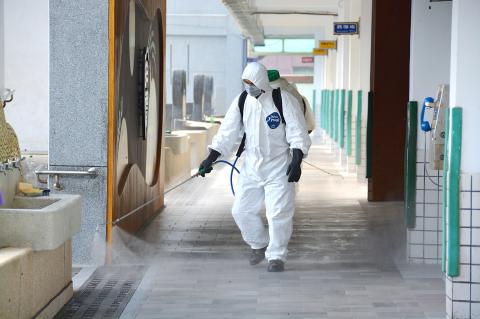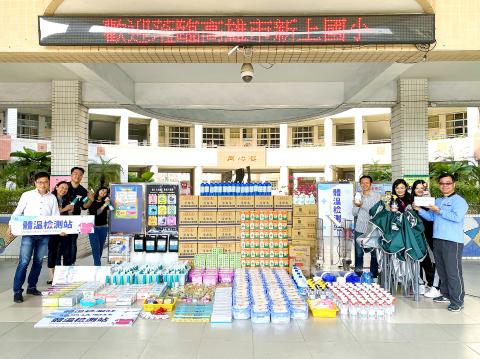The Ministry of Education (MOE) yesterday issued guidelines for suspension of classes should cases of COVID-19 be confirmed on campus.
Schools from kindergartens to senior-high are scheduled to reopen on Tuesday next week, after the start of classes following the winter break was delayed by two weeks due to concerns about the COVID-19 outbreak in China.
Universities are expected to begin their second semester of the academic year on or after Tuesday.

Photo: Wang Chun-chi, Taipei Times
According to the ministry’s guidelines, a class would be suspended in kindergartens through senior-highs if one student or teacher is confirmed by the Central Epidemic Command Center (CECC) to have the virus.
If two or more students or teachers at a school are confirmed to have the virus, the school must suspend all classes.
If one-third of schools in a township or district have been forced to shut due to the virus, the remaining schools must close as well, the guidelines state.

Photo: Huang Hsu-lei, Taipei Times
If one university student or teacher is infected, all courses taken by that student or taught by the instructor would be suspended, while in the event of two or more confirmed cases, the university must close its campus, the ministry said.
Class suspensions would last 14 days, it said, adding that the guidelines could be subject to change.
In addition, all public events held by a school should be suspended if there is a confirmed case on campus, the ministry said.
Taipei Deputy Mayor Vivian Huang (黃珊珊) told reporters that guidelines left questions about how close or far apart the first and second cases of COVID-19 at a school would have to be to warrant a school-wide closure and the ministry should clarify the issue.
Otherwise, there could be “mistakes in judgement,” Huang said.
The Taipei City Government has set a 14-day time frame, meaning that a school would close if two cases are confirmed within 14 days of each other, she said.
Taipei Department of Education Director Tseng Tsan-chin (曾燦金) said the 14-day time frame was based on COVID-19’s 14-day incubation period, but the department would consult with the CECC.
Additional reporting by Tsai Ya-hua

CHANGING LANDSCAPE: Many of the part-time programs for educators were no longer needed, as many teachers obtain a graduate degree before joining the workforce, experts said Taiwanese universities this year canceled 86 programs, Ministry of Education data showed, with educators attributing the closures to the nation’s low birthrate as well as shifting trends. Fifty-three of the shuttered programs were part-time postgraduate degree programs, about 62 percent of the total, the most in the past five years, the data showed. National Taiwan Normal University (NTNU) discontinued the most part-time master’s programs, at 16: chemistry, life science, earth science, physics, fine arts, music, special education, health promotion and health education, educational psychology and counseling, education, design, Chinese as a second language, library and information sciences, mechatronics engineering, history, physical education

The Chinese military has boosted its capability to fight at a high tempo using the element of surprise and new technology, the Ministry of National Defense said in the Quadrennial Defense Review (QDR) published on Monday last week. The ministry highlighted Chinese People’s Liberation Army (PLA) developments showing significant changes in Beijing’s strategy for war on Taiwan. The PLA has made significant headway in building capabilities for all-weather, multi-domain intelligence, surveillance, operational control and a joint air-sea blockade against Taiwan’s lines of communication, it said. The PLA has also improved its capabilities in direct amphibious assault operations aimed at seizing strategically important beaches,

‘MALIGN PURPOSE’: Governments around the world conduct espionage operations, but China’s is different, as its ultimate goal is annexation, a think tank head said Taiwan is facing a growing existential threat from its own people spying for China, experts said, as the government seeks to toughen measures to stop Beijing’s infiltration efforts and deter Taiwanese turncoats. While Beijing and Taipei have been spying on each other for years, experts said that espionage posed a bigger threat to Taiwan due to the risk of a Chinese attack. Taiwan’s intelligence agency said China used “diverse channels and tactics” to infiltrate the nation’s military, government agencies and pro-China organizations. The main targets were retired and active members of the military, persuaded by money, blackmail or pro-China ideology to steal

The High Prosecutors’ Office yesterday withdrew an appeal against the acquittal of a former bank manager 22 years after his death, marking Taiwan’s first instance of prosecutors rendering posthumous justice to a wrongfully convicted defendant. Chu Ching-en (諸慶恩) — formerly a manager at the Taipei branch of BNP Paribas — was in 1999 accused by Weng Mao-chung (翁茂鍾), then-president of Chia Her Industrial Co, of forging a request for a fixed deposit of US$10 million by I-Hwa Industrial Co, a subsidiary of Chia Her, which was used as collateral. Chu was ruled not guilty in the first trial, but was found guilty